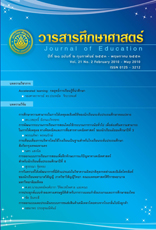การจัดการความรู้ (Knowledge Management- KM)
คำสำคัญ:
การจัดการความรู้ (Knowledge Management), องค์การแห่งการเรียนรู้ (Learning Organization), ความรู้ที่อยู่ในตัวบุคคล (Tacit Knowledge), ความรู้ชัดแจ้ง(Explicit Knowledge), ชุมชนนักปฏิบัติ (Community of Practice)บทคัดย่อ
บทคัดย่อ
ในยุคสังคมแห่งฐานความรู้ แนวคิดการจัดการความรู้ได้ก่อให้เกิดการเปลี่ยนแปลงในการบริหารจัดการทั้งทางด้านเศรษฐกิจ สังคม และการศึกษา ความต้องการในการพัฒนาประเทศในด้านต่าง ๆ ส่งผลให้องค์การเกิดการแข่งขันกันด้วยความรู้ เทคโนโลยี และนวัตกรรม “การจัดการความรู้” เป็นเครื่องมือสำคัญที่ช่วยในการพัฒนาบุคลากรทางการศึกษาให้สามารถใช้ประโยชน์จากข้อมูลสารสนเทศทั้งที่มีอยู่ในปัจเจกบุคคล องค์การและชุมชน เพื่อการพัฒนาศักยภาพของตนเอง และพัฒนาคุณภาพผู้เรียน บทความเรื่องการจัดการความรู้ มีวัตถุประสงค์เพื่อทบทวนแนวคิดและทฤษฎีเกี่ยวกับความหมายและความสำคัญของการจัดการความรู้ กระบวนการจัดการความรู้ รูปแบบการจัดการความรู้ การพัฒนาองค์การให้มีการจัดการความรู้ กิจกรรมที่ใช้ในการจัดการความรู้ ประโยชน์ รวมทั้งปัญหาและอุปสรรคในการจัดการความรู้ ผู้บริหารและบุคลากรทางการศึกษา รวมทั้งผู้เรียน สามารถนำแนวคิดต่างๆ ไปประยุกต์ใช้เป็นแนวทางในการพัฒนาตนเอง ตลอดจนพัฒนาหน่วยงานและองค์การให้เป็นสังคมแห่งการเรียนรู้ที่ส่งเสริมให้คนไทยได้เรียนรู้ตลอดชีวิตอย่างมีคุณภาพ ตามแนวการปฏิรูปการศึกษาในทศวรรษที่สองต่อไป
Abstract
In a knowledge-based society, the concept of knowledge management has brought about changes in economic, social and educational management. A need of national development in many areas has precipitated competition among organizations in terms of knowledge, technology and innovations. “Knowledge management” is a critical tool for the development of educational personnel, who need to be able to make the utmost benefits of information hidden in the individual, in an organization and in a community; so that they could improve self-potential as well as the quality of their learners. This paper entitled “ Knowledge Management” aims to review concepts and theories about the meanings and significance of knowledge management, the knowledge management processes and models, the improvement of an organization to efficiently manage its knowledge, activities for knowledge management, the benefits of knowledge management, including problems and obstacles that may arise. Administrators and educational personnel as well as learners could apply such concepts and ideas as a guideline for self-improvement and for the development of their units and organizations to be a “learning society” which helps promote the quality life-long learning for Thai people, within the framework of educational reform in the second decade.
ดาวน์โหลด
รูปแบบการอ้างอิง
ฉบับ
ประเภทบทความ
สัญญาอนุญาต
ลิขสิทธิ์ของบทความที่ปรากฏในวารสารศึกษาศาสตร์ มหาวิทยาลัยบูรพา เป็นของวารสารศึกษาศาสตร์ มหาวิทยาลัยบูรพา ทั้งนี้บทความทุกเรื่องผ่านการตรวจสอบความถูกต้องทางวิชาการจากผู้ทรงคุณวุฒิ ข้อความและข้อมูลของบทความในวารสารฯ เป็นแนวคิดของผู้แต่ง มิใช่เป็นความคิดเห็นของกองบรรณาธิการ และมิใช่ความรับผิดชอบของคณะศึกษาศาสตร์ มหาวิทยาลัยบูรพา ไม่สงวนลิขสิทธิ์การนำไปใช้ประโยชน์ทางวิชาการแต่ต้องอ้างอิงแสดงแหล่งที่มาและอยู่ในขอบเขตของกฎหมายลิขสิทธิ์



